Kosshy, Akmola Region, Kazakhstan — As dusk settled over the September evening, around 7 p.m., Gulsim Kamiyeva sat by her son, Erbayan, watching his faint breaths. His face had paled, eyes moving sluggishly. She had a timer running. In recent months, Erbayan Mukhtar had been breathing through a special plastic tube attached to his trachea. This time, he was practicing without it for about 30 minutes – longer than usual.
Doctors had attached a pulse oximeter to monitor his heart rate, blood oxygen level, and blood pressure. But he frequently removed it, so Gulsim held his hand, monitoring him herself. Erbayan gripped his mother’s hand tightly, as if he didn’t want to let go.
When the timer buzzed, his sister, Kundyz Mukhtar, carefully cleaned the breathing tube and gently wiped his mouth.
Erbayan, who had suffered a mysterious fall during his military service, was slowly recovering. His family – especially his mother and sister – remained constantly by his side, helping with every need. They provided him with cooled water and food through a tube in his nose. Each time Erbayan tried to smile or express joy with his eyes, Gulsim’s heart swelled with tenderness.
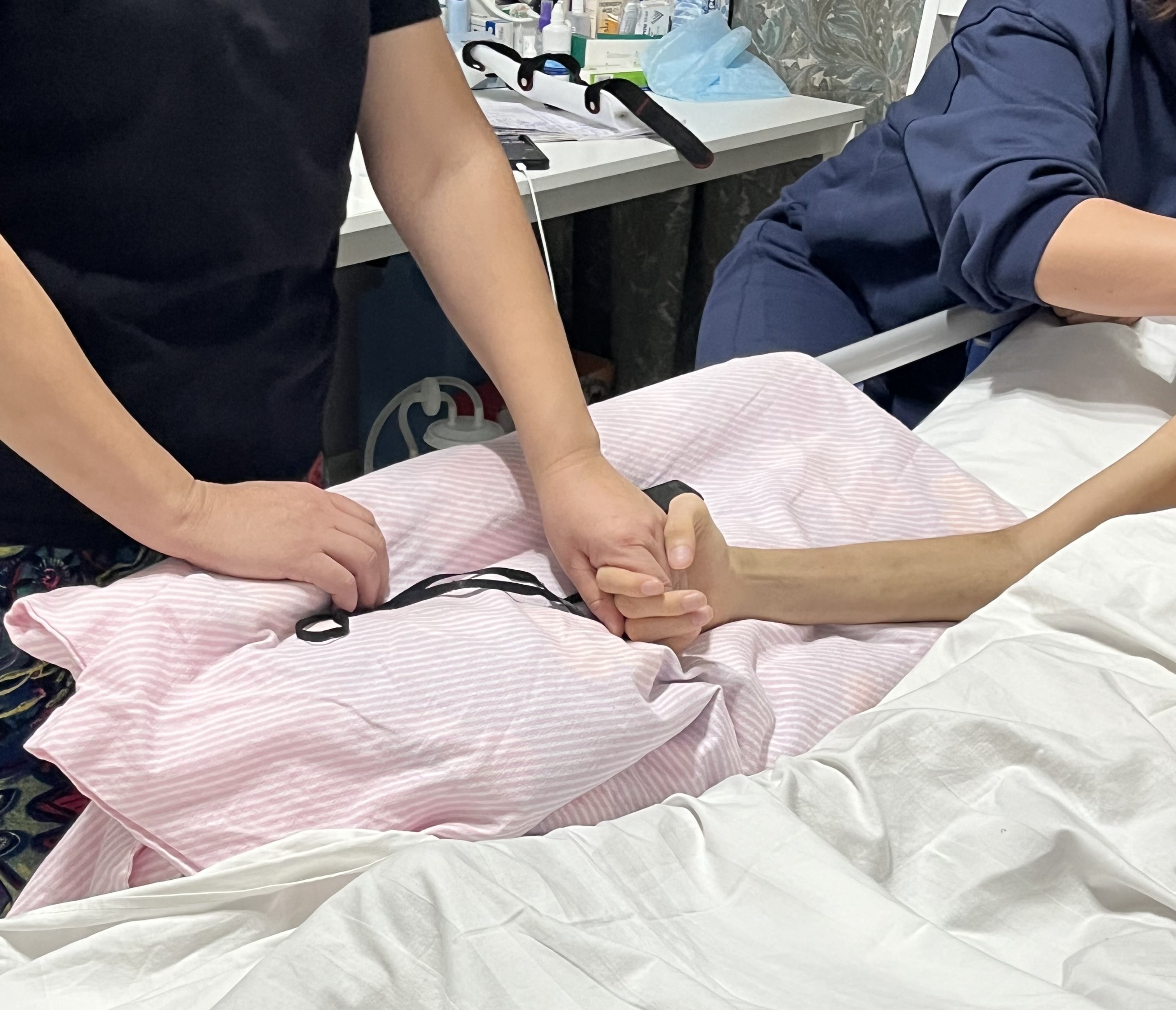
Gulsim holds her son’s hand during occasional physical rehabilitation in Kosshy. September 23, 2024. Photo: Moldir Kabyken
Drafted Into the Military
At 22, Erbayan Mukhtar had been a first-year student at the Academy of Physical Education and Mass Sports in Astana before joining the military last year. He dreamed of becoming a soccer coach.
According to his sister, Kundyz, on June 27, 2023, two officers came to their house and took Erbayan to the army. It happened so fast that he barely had time to say goodbye to his father, Hamit Aitmagambetov.
“Erbayan had been planning to join the military in the fall with a close friend named Bakdaulet. However, the officers explained that he was being called up earlier because there was a shortage of enlisted soldiers,” she said.
In recent years, military recruitment has become a problem in Kazakhstan, leading officials to frequently search for young men aged 18 to 27 at their homes or on the streets during the fall and spring to hand them draft notices. In some cases, individuals have been taken without informing their relatives.
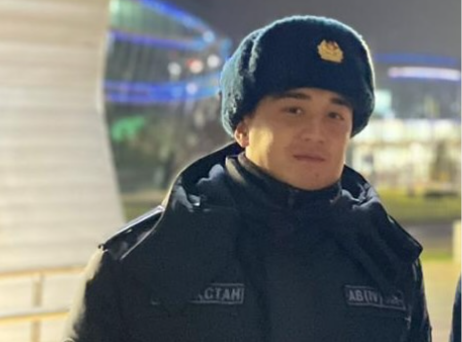
Erbayan was deployed to ensure security on the streets of Almaty in the fall of 2023. Photo: Instagram | erbayan2024
Erbayan chose to fulfill his duty with the National Guard. He was first stationed at Unit 5574 in Zhetyken village, Almaty Region. His family said they received weekly calls from him on Sundays.
In November 2023, Erbayan was transferred to National Guard Unit 5571 in Almaty. His father, Hamit, said he had heard that transfers like this were standard military procedure.
The National Guard is a military institution under the Ministry of Internal Affairs, tasked with maintaining public order and ensuring the protection of human rights in 19 cities across Kazakhstan. National Guard soldiers are often deployed to provide security during major international, national, or regional events.
Once Erbayan was stationed at the new unit, he began asking friends and family for money. He asked his parents for sums between 2,000 and 5,000 tenge several times. He also borrowed 20,000 tenge from his brother and sums of 25,000 to 30,000 tenge from various friends. When relatives asked, he always avoided explaining why he needed the money or where he would spend it.
The Incident
Erbayan occasionally shared details about his military service with his father. Hamit recalled that after the transfer to Almaty, his son had been working as a driver.
On December 4, 2023, Erbayan suffered a head injury and was rushed to Almaty’s City Clinical Hospital No. 12. His condition worsened, and he was admitted to the intensive care unit. According to the family, the incident occurred around 2 a.m. while he was on duty.
Kundyz said that initially, National Guard representatives told them, “Erbayan is fine, he just fell.” The family repeatedly called the commanders for details, demanding an explanation, but were met with vague reassurances that his condition was stable.
It wasn’t until 4 p.m. that day that they learned Erbayan had sustained a severe head injury and was in the intensive care unit.
His parents immediately booked flights and rushed to Almaty. When Gulsim first saw her son in intensive care, she hardly recognized him. His eyes were bruised and swollen.
“At first, I couldn’t even tell which one was my son,” Gulsim said, recalling the moment with a breaking voice. “There were several people in the room, and Erbayan’s head was completely bandaged. I cried. It was unbearable.”
The Battle for a Soldier’s Life
In recent years, more stories have emerged from Kazakhstan’s armed forces of soldiers either returning home severely injured or never returning at all, having died tragically after alleged hazing incidents. These cases, like that of Erbayan, have sparked a public outcry, with many young people and their parents voicing concerns about military service and demanding reforms.
Defense and internal affairs ministry representatives maintain that hazing is not a systemic issue and that many of the deaths reported are unrelated to the soldiers’ military service.
In April 2023, Maksat Kaziev, a representative from the Military Prosecutor’s Office, revealed that 270 military personnel had died over the past three years – 78 in 2020, 96 in 2021, 85 in 2022, and 11 in the first four months of 2023. These numbers include not only conscripted soldiers but also personnel from the Ministry of Defense, National Guard, National Security Committee, State Security Service, and the Ministry of Emergency Situations.
On September 20, 2024, officials from Kazakhstan’s armed forces held a press briefing in Astana to report that criminal incidents in the military were actually decreasing.
Deputy Defense Minister Shaikh-Hasan Jazykbayev stated that hazing cases had dropped by 28 percent over the past three years, with 32 cases in 2021, 23 in 2022, and 13 in 2024. Another Defense Ministry representative, Tileukhan Baskozhaev, noted a reduction in fatalities, with 53 deaths in 2021, 44 in 2022, 42 in 2023, and 32 in the first nine months of 2024.
During the same briefing, National Guard Deputy Commander Kairat Umbetov commented on Erbayan’s case, stating that the soldier had collapsed in the bathroom, suffering a head injury.
“Erbayan Mukhtar woke up at 2:15 a.m. on December 4, 2023, and went to the restroom, where he collapsed. There were witnesses. The investigation is ongoing, conducted by the military investigative department of the Ministry of Internal Affairs,” Umbetov explained.
There were reportedly other soldiers in the bathroom at the time.
According to RFE/RL’s Kazakh Service, Azattyq, doctors diagnosed Erbayan with an acute subdural hematoma caused by brain compression, and he had fractures in his skull as well as swelling in his brain. The medical team at his unit reported that he was conscious immediately after his fall and complained of severe head pain.
Nauryz Baybatyrov, who was a doctor with the military unit where Erbayan served, stated in an interview on March 18 that he had likely passed out after sitting for too long in the bathroom.
“From what I’ve heard, [Erbayan] was using the bathroom. You know, when someone sits and stands up suddenly, they can get dizzy. Maybe that’s why [he collapsed]. But I can’t give a definitive verdict,” the doctor said.
Erbayan’s family does not believe that the fall was accidental. His mother, Gulsim Kamiyeva, pointed out the other injuries on her son’s body.
“He had a broken nose, but the doctors never mentioned it,” Gulsim said. “There were other wounds on his head and even on his back. How could he have sustained these injuries if he only fell on one side?”
After Erbayan was admitted to the intensive care unit in an Almaty hospital, he immediately slipped into a coma. Initially, the family were allowed to visit him daily, but eventually, the hospital’s head doctor instructed the security guard to prevent them from entering. Erbayan’s brother, Nauryzbai Mukhtar, later shared a note written by the head doctor to the security guard, instructing him to restrict their access.
Nineteen days after the incident, on December 23, Erbayan emerged from his coma.
According to his relatives, he was able to respond with eye movements and even raised his hand in greeting. A few days later, Gulsim asked her son about the incident in the bathroom.
“I asked Erbayan, ‘Did someone hit you?’ and my son nodded ‘yes,'” his mother said. When his father later asked the same question, Erbayan gave the same response.
Hamit explained that after emerging from the coma, Erbayan’s condition seemed to be improving. The doctors were planning to move him to a private room within a week. However, on January 12, 2024, Erbayan was transferred to a military hospital run by the Ministry of Defense without the family’s knowledge.
“I refused to give permission. I wanted him to continue recovering at that hospital. They agreed, but still transferred him without our consent,” Gulsim said.
According to Gulsim, the tests Erbayan underwent at the civilian hospital came back normal, and the doctors assured her that the swelling in his brain was not a significant concern. However, when he was moved to the military hospital, Erbayan’s condition quickly deteriorated again.
“When we arrived at the military hospital, Erbayan squeezed my hand tightly, tears running down his face, and wouldn’t let go. His grip left marks on my hand that didn’t fade for a week,” Gulsim said, holding back tears as she recalled the incident.
Hamit told MNU Newsroom that Erbayan underwent three surgeries. During that time, the doctors at the military hospital removed the right side of his brain and part of his skull. The doctors explained to his parents that this was done out of necessity because “fluid had accumulated in Erbayan’s brain, posing a life-threatening risk.”
Ongoing Investigation
The Ministry of Internal Affairs provided no direct answers regarding the surgeries Erbayan underwent. They merely acknowledged that an investigation was underway under Article 440, Section 3, Paragraph 4 of the Criminal Code (related to serious bodily harm caused by hazing in the military).
Erbayan’s lawyer, Inga Imanbai, spoke to ORDA News on June 13, raising questions about the number of soldiers in the bathroom during the incident.
“Why were eight soldiers in the bathroom at 2 a.m.? What were they doing there? And then Erbayan ends up in a coma,” she said.
According to Imanbai, the investigation into Erbayan’s case was initially stalled for six months but resumed after her complaints to higher authorities. New investigators were assigned, and Erbayan’s parents were allowed to participate in the investigation.
In an interview with YouTube channel AIRAN on August 24, Hamit recounted reviewing footage from the bathroom security camera with the investigators.
“As we saw from the camera, my son entered the bathroom. 1 minute and 50 seconds later, four soldiers carried him out,” Hamit said.
He added that a senior sergeant was also present in the bathroom, having entered before Erbayan and leaving after his collapse.
Recovery Process
After the surgery, military hospital doctors advised Gulsim to take her son to Astana for further treatment. However, she refused, fearing that her son, who had just undergone surgery, would not survive the long journey.
On January 22, Erbayan was transferred again to City Clinical Hospital No. 12. That same month, Erbayan’s grandfather in Astana fell seriously ill and passed away, forcing Gulsim and Hamit to leave their son in the care of doctors and quickly head to Astana.
Even after leaving, they continued to call the hospital in Almaty every day to check on their son’s condition. The doctors reported his slow recovery, but on February 24, Erbayan fell back into a coma.
Despite lying between life and death, Erbayan fought hard. After spending more than two months in a coma, he woke up again on April 11.
“Coming out of the second coma was incredibly hard for him. Half of his brain had been removed. His eyes were bloodshot, and he was incredibly weak. I couldn’t recognize him; it didn’t seem like him,” Kyndyz recalled.
The doctors in the Almaty city hospital said that although Erbayan was awake, he showed no signs of awareness. His sister disagreed.
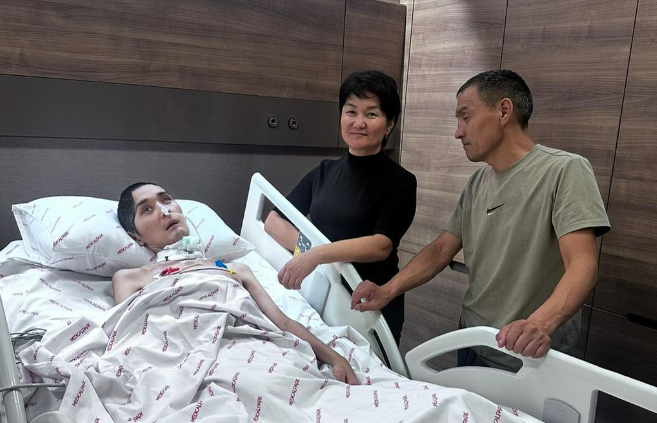
Erbayan, with the help of his parents, finally arrived at a clinic in Turkiye for further treatment. September 27, 2024. Photo: Instagram | erbayan2024
“The doctors told me, ‘Your brother can’t think. Any reactions you see aren’t his.’ But when I was with him, if he needed the bathroom or something hurt, he would try to respond as much as possible. If he couldn’t think, he wouldn’t react at all,” she said.
Although he was still weak, Hamit and Gulsim decided to move Erbayan to Astana for continued treatment once he had woken up.
On July 5, the Ministry of Health’s air ambulance service transported Erbayan from Almaty to the National Neurosurgery Center in Astana. By the end of July, he was diagnosed with a first-degree disability, which under Kazakh regulations refers to a person with persistent, significant, or pronounced impairments of bodily functions that lead to a limitation of their ability to engaging in some, or many, life activities.
Parents Holding on to Hope
Erbayan’s parents no longer trust the government. They are doing everything possible to ensure their son receives proper care and are pushing for justice against those responsible for his condition, criticizing the slow pace of the investigation.
After Erbayan’s treatment at the National Neurosurgery Center, they brought him home. Gulsim, Kyndyz, and other family members have been taking care of him daily.
“The case started with lies and continues with lies. I don’t believe Erbayan fell on his own. My brother is not weak. He was an athlete, a football player,” said Kyndyz.
Hamit and Gulsim mentioned that commanders from the National Guard promised to help with Erbayan’s treatment. For the first three months, they remained silent, waiting for their son to recover.
According to Hamit, some people even offered a large sum of money and a house to close the case, but they refused.
Erbayan has two younger sisters and a brother. Nineteen-year-old Kyndyz dropped out of university to help with her brother’s recovery, and Gulsim also left her job to take care of him. Now, the family’s only income comes from Hamit, who works as a driver.
Hamit said that after Erbayan returned home, he required professional care. They hired a nurse to come to their house and look after him.
In August, the family publicly announced their plans to seek treatment for Erbayan in Germany and asked for help. In just a few days, they raised 218 million tenge (roughly equivalent to $452,000). Nauryzbay Muhtar opened Instagram and TikTok accounts dedicated to Erbayan, providing daily updates about his condition and progress.
On September 25, Nauryzbay went live on Instagram to share that the trip to Germany had been delayed. An infection had been found in Erbayan’s body. Nauryzbay said that the German clinic had declined to accept Erbayan due to the infection, which had been detected by specialists at the National Neurosurgery Center.
“Negotiations with another clinic in Germany could take several more months,” he said.
After this delay, the family began searching for a clinic in Turkiye, consulting with doctors. By September 25, the fund for Erbayan’s treatment reached to 250 million tenge (roughly equivalent to $519,000). On the morning of September 27, Erbayan, accompanied by his parents, boarded a military plane provided by the Ministry of Defense, bound for Istanbul. Medical staff from the air ambulance service accompanied them.
“If all goes well, we’ll stay in Turkiye for 90 days. They’ve called us for three months for now. We’ll see what happens next based on his treatment,” Hamit Aytmagambetov said on the day they departed.
The family did not disclose which clinic in Turkiye they would be visiting or what treatment Erbayan would receive but shared a photo after arriving in Istanbul.
According to Nauryzbay, who remained in Kazakhstan, Erbayan underwent a full medical examination in Istanbul. Turkish doctors are planning to place a plastic or titanium implant on the right side of his skull.
Meanwhile, Erbayan’s lawyer, Inga Imanbai, complained on October 10 that the investigation had stalled again. She had requested a new forensic medical examination in June, but it had yet to be completed. In mid-October, Imanbay visited the Southern Regional Military Investigation Department in Almaty to review Erbayan’s case.
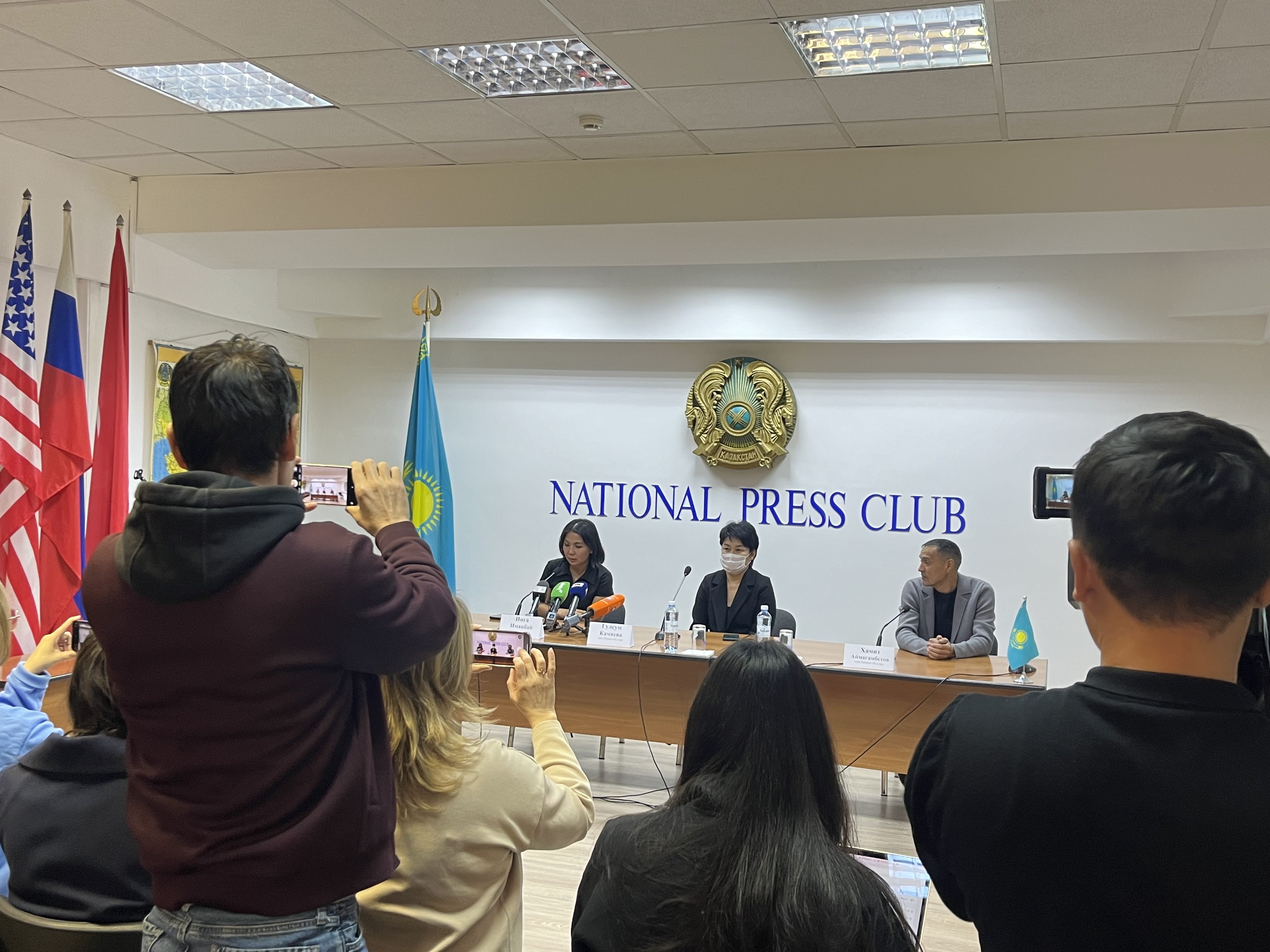
Erbayan’s parents and his lawyer Imanbai answering journalists during a press briefing in Astana. September 17, 2024. Photo: Moldir Kabyken
“On October 1, a resolution was issued. In addition to the main criminal case regarding Erbayan, a separate case has been opened and investigated concerning the actions of doctors at the military hospital and City Clinical Hospital No. 12,” she said.
In recent years, there has been growing public discussion in Kazakhstan about the deaths of soldiers in the military, either from accidents or suicides. In 2022, a soldier named Almaz Shakhimov, from the same 5571 military unit where Erbayan served, died on August 9. Official statements claimed that his death was caused by a storm collapsing a tent on him. However, two years later, Shakhimov’s mother exhumed her son’s body and discovered that he had been stabbed.
Earlier this year, in May, Nurzhigit Abdilpatta, a young soldier from Kostanay serving in in Otar, Zhambyl region, was hospitalized after only a few weeks in the army. The 19-year-old slipped into a coma shortly afterward and spent nearly a month in an intensive care unit.
In an interview with Azattyq, Nurzhigit’s mother said that her son had been hazed and abused. The Ministry of Defense denied this, stating that the soldier had pneumonia and that “there were no signs of any physical assault or injury.”
This wasn’t the first scandal involving abuse at military unit 30212, where Abdilpatta served. In April 2022, a soldier named Alibek Kalbai from Mangystau region mysteriously died just four days after starting his military service. An investigation later revealed that he had been severely beaten by fellow soldiers.
In early September, amid mounting outrage over such incidents, a petition was launched demanding an end to mandatory military service in Kazakhstan. According to government rules, a petition must receive at least 50,000 signatures to be considered.
The petition’s author, citing recent military tragedies, called for replacing mandatory service with a professional volunteer military force. Although the petition garnered around 60,000 signatures in a short time, it was ultimately dismissed by the government.
According to Qumash, a social media news group, the Ministry of Defense referenced the country’s constitution, stating that “issues related to defense, national security, and public order cannot be raised in petitions.”
As for Erbayan, who has been bedridden for more than 10 months, he continues his treatment in Turkiye. Recently, his family shared on social media that his condition is stable.
“I think about the way Erbayan used to be every day. I can still hear him running to me and calling out ‘mama,’” his mother said, tears welling in her eyes.
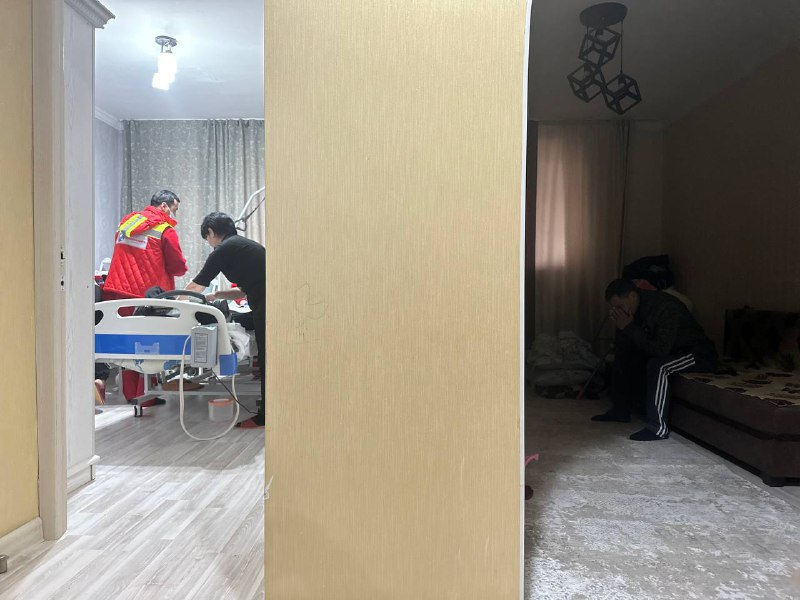
While staff members of medical aviation prepare Erbayan for the flight in his home, his father holds his breath in hope that Erbayan can make it to Istanbul, September 27, 2024. Photo: Moldir Kabyken.
This article was produced in partnership with Maqsut Narikbayev University’s MNU Newsroom.
A version of this article is available in Kazakh.

































